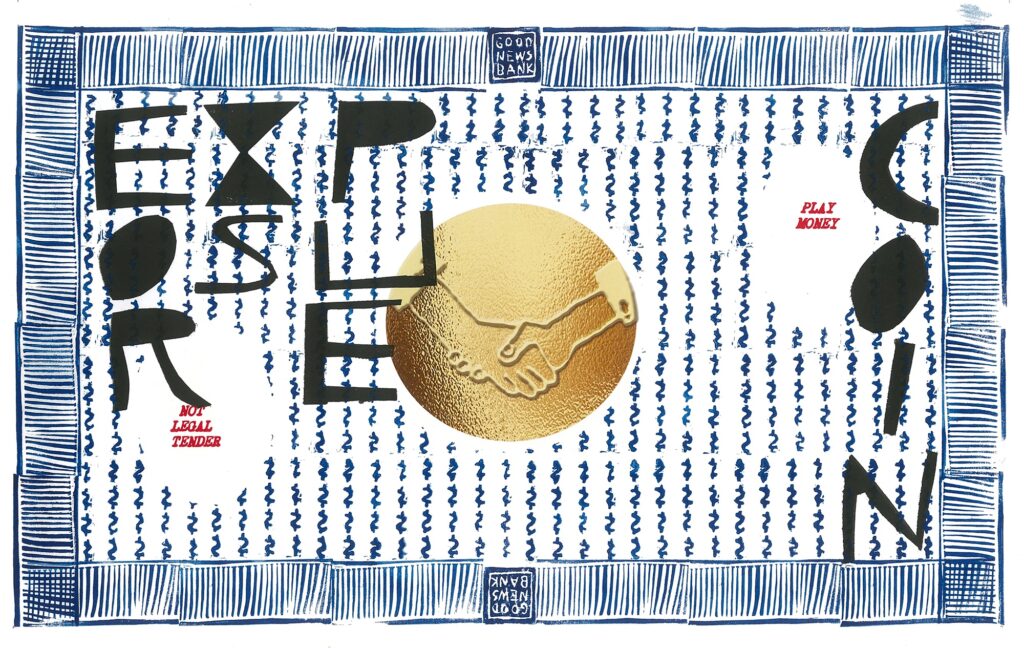
Artist Commission
Last year, AICSA commissioned artists to produce work inspired by five key advocacy messages. We asked Nicholas Hanisch and Cassie Thring to create a piece inspired by the message:
A fair deal for artists.
Artists and arts workers deserve fair jobs, pay, entitlements and security. Forward-thinking policies such as an arts employment strategy, portable leave entitlements, basic income pilots, and strategies to combat artists’ poverty and precarity, and stop wage theft, will keep artists and arts workers working – and making work – in South Australia.
Artist Statement: We have created a Good New$ Bank Exposure Coin Banknote through repetitive layered printmaking techniques. It was made with a combination of linocut stamp making, digital printing, and screen printing. Our banknote references the often backwards economy of artist compensation, while playfully both encouraging and critiquing aesthetics of wealth. There is a relationship between “fake”, monopoly money and the expectation of artists working for free. The handshake promise of the golden good times to come if you just “make good art” doesn’t pay for your landlord’s mortgage.
AICSA’s Work: To inform our advocacy surrounding the financial wellbeing and safety of artists and arts workers in SA, we undertook a survey of the sector in 2024.
AICSA RELEASES SA ART SECTOR FINANCIAL WELLBEING, MENTAL HEALTH & WHS REPORT 2024
Workplace Health and Safety is an element of the wellbeing of artists and arts workers. To find out more about the current state of the sector, the Arts Industry Council of South Australia (AICSA) surveyed people working in the sector with the aim to support a better understanding about financial wellbeing and Work Health and Safety (WHS) issues facing artists, arts workers and arts organisations. This knowledge will help identify gaps in the current level of support for the sector, which will assist advocacy work and the development of better resources, materials and services for arts and cultural workers.
The survey results show that artists and arts workers are overworked and underpaid, with a high proportion of poverty wages, precarity and lack of basic entitlements/protections such as superannuation. This is impacting on their life pathways and financial stability. Combined with a high frequency of exposure to bullying and culturally unsafe practices, the respondents of the survey reported poor mental health, with high indications of anxiety and depression.
Summary of findings
- 137 respondents:
- Average respondent is a 35–44-year-old female, not of Aboriginal or Torres Strait Islander descent
- 57% indicated that they worked within more than one art form, however visual arts was most commonly represented (45%)
- Of the primary occupations listed, arts administration roles represented 42% of respondents, and artists 31%.
- Only 27% are full time permanent workers
- 64% have worked in the sector for over a decade
- Lower than average wages:
- 81% earn less than $80k per annum
- 39% earn less than $40k per annum
- 13% of artists don’t earn any money or lose money from their arts practice
- The length of time respondents have worked in the sector did not necessarily impact their income
- 41% work in a role outside the sector to supplement their income
- 62% believe that their income is not commensurate with hours worked
- Low rates of entitlements:
- Only 78% of respondents reported that they received superannuation
- Support systems:
- 67% are un-unionised, with 66% reporting they negotiated their own salary
- 43% reported that a spouse/family member/partner has a salaried role which provides financial support
- Wellbeing:
- 40% rated their financial wellbeing as precarious or very precarious
- Commonly reported unrealistic time pressures and long work hours
- Bullying and culturally unsafe practices are commonly experienced
- Musicians were the most common profession to report witnessing or experiencing alcohol abuse
- Respondents expressed a high frequency of anxiety and depression indicators:
- 46% described their mental health as ‘Poor’ or ‘Fair’
- 46% said they felt tired, sluggish or depressed ‘Always’ or ‘Often’
- 49% said they feel anxious or overwhelmed ‘Always’ or ‘Often’
- Qualitative responses linked poor mental health to work precarity and pay.
Full report is available below:
This research is supported by the Healthy Workplaces Strategy Grants Program, which is funded by Preventive Health SA and administered by the South Australian Business Chamber.
Art commission was made possible with assistance from the Arts SA Arts Recovery Fund.
